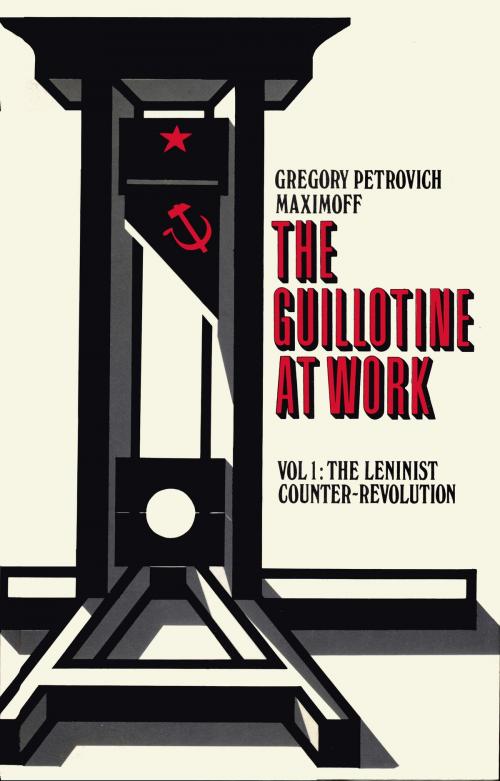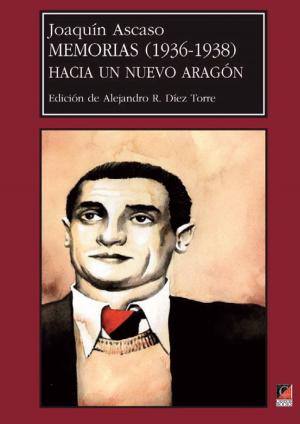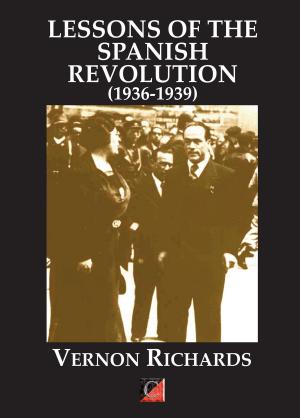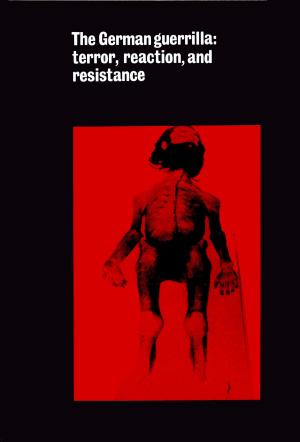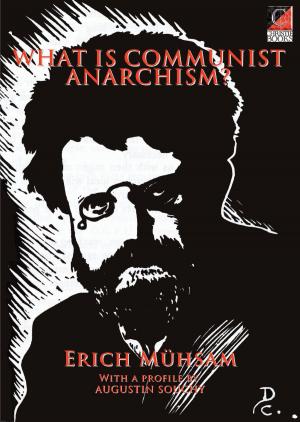THE GUILLOTINE AT WORK Vol. 1
The Leninist Counter-Revolution
Nonfiction, History, Eastern Europe, Revolutionary, Modern, 20th Century| Author: | Gregory Petrovitch Maximoff | ISBN: | 1230000272985 |
| Publisher: | ChristieBooks | Publication: | October 9, 2014 |
| Imprint: | ChristieBooks | Language: | English |
| Author: | Gregory Petrovitch Maximoff |
| ISBN: | 1230000272985 |
| Publisher: | ChristieBooks |
| Publication: | October 9, 2014 |
| Imprint: | ChristieBooks |
| Language: | English |
The Guillotine At Work Vol 1 develops the theme that the Stalinist terror of the 1930s-1950s, the bureaucratisation of Russian society, the imperialist escapades, through to the total disregard for human rights in the Soviet Union and other East European countries under its dominion were not aberrations in the development of a socialist society, but rather a logical development of Marxist philosophy which found its orientation in the writings and actions of Lenin (and Trotsky), had Stalin as one of its chief protagonists, and throughout its history had a host of faceless bureaucrats maintaining and bolstering its repressive regime with even more sophisticated control of the hearts and minds of the peoples of Eastern Europe. The Guillotine At Work serves one main purpose: “to dispel the aura which Lenin’s disciples have bestowed on him by showing that Lenin was primarily concerned with attaining power and holding on to it as a dictator by means of terror.”
Originally published in two volumes in 1940, this is the (partly eyewitness) account of the Leninist terror inflicted upon Russia and the then Soviet Union. Maximoff, a life-long anarchist, fought in the Russian Revolution, organized with the metalworkers union, and was imprisoned by Lenin’s secret police in 1920 when he refused to join the Red Army (he was happy to fight the Whites, but not put down workers’ and peasants’ uprisings). Exiled, he wrote this incredible indictment, in English. Over the course of nearly 400 pages, he recounts not only the Leninist terror and reaction against the popular revolution, but shows how the actions of Stalin followed deliberately in his master’s—and mentor’s—footsteps.
Grigori Petrovitch Maximov (1893-1950), Russian anarcho-syndicalist. After studying for the priesthood, Maximov moved to Saint Petersburg, where he graduated in 1915 as an agronomist at the Agricultural Academy. As a student he joined the revolutionary movement and was an active propagandist. After the 1917 revolution he joined the Red Army, but when the Bolsheviks employed the Army in police work to disarm the workers, he refused to obey orders and was sentenced to death. Only the intervention and solidarity of the metalworkers’ union saved his life. In 1918 Maximov edited the anarchist-syndicalist papers Golos Truda (Voice of Labour) and Novy Golos Truda (New Voice of Labour). He became a leading figure in NABAT (Anarchist Organizations of Ukraine, organized by Voline) and secretary of the Confederation of Russian Anarcho-Trade Unions. On March 8 1921, during the Kronstadt revolt, he was arrested and imprisoned again, in Moscow’s Taganka Prison, along with other members of NABAT. Four months later he began a hunger strike for 10 days and ended it only after the intervention of European Syndicalists attending the Congress of the Red Trade Union International secured their exile abroad. Expelled, along with Voline and others, Maximov moved to Berlin, where he edited Rabotchy Put' (Labour's Path, or, Worker’s Way), a paper of the Russian Syndicalists in exile and participated in founding the A.I.T. (the umbrella organization of anarcho-syndicalists of 12 countries - FORA, USI, SAC, FAUD, CNT, etc. - which encompassed several million members and was headed by Rudolf Rocker, Augustin Souchy and Aleksandr Schapiro), as well as the “Defence Committee for the Revolutionists Imprisoned in Russia”. Maximov then moved to Paris, then to the USA, where he settled in Chicago and worked as a tapestry maker, becoming a leading newspaper trade unionist of the IWW (Industrial Workers of the World). He edited Golos Truzhenika (Worker's Voice) & later Delo Truda - Probuzhdenie (Labour's Cause-Awakening) until his death on March 16, 1950.
The Guillotine At Work Vol 1 develops the theme that the Stalinist terror of the 1930s-1950s, the bureaucratisation of Russian society, the imperialist escapades, through to the total disregard for human rights in the Soviet Union and other East European countries under its dominion were not aberrations in the development of a socialist society, but rather a logical development of Marxist philosophy which found its orientation in the writings and actions of Lenin (and Trotsky), had Stalin as one of its chief protagonists, and throughout its history had a host of faceless bureaucrats maintaining and bolstering its repressive regime with even more sophisticated control of the hearts and minds of the peoples of Eastern Europe. The Guillotine At Work serves one main purpose: “to dispel the aura which Lenin’s disciples have bestowed on him by showing that Lenin was primarily concerned with attaining power and holding on to it as a dictator by means of terror.”
Originally published in two volumes in 1940, this is the (partly eyewitness) account of the Leninist terror inflicted upon Russia and the then Soviet Union. Maximoff, a life-long anarchist, fought in the Russian Revolution, organized with the metalworkers union, and was imprisoned by Lenin’s secret police in 1920 when he refused to join the Red Army (he was happy to fight the Whites, but not put down workers’ and peasants’ uprisings). Exiled, he wrote this incredible indictment, in English. Over the course of nearly 400 pages, he recounts not only the Leninist terror and reaction against the popular revolution, but shows how the actions of Stalin followed deliberately in his master’s—and mentor’s—footsteps.
Grigori Petrovitch Maximov (1893-1950), Russian anarcho-syndicalist. After studying for the priesthood, Maximov moved to Saint Petersburg, where he graduated in 1915 as an agronomist at the Agricultural Academy. As a student he joined the revolutionary movement and was an active propagandist. After the 1917 revolution he joined the Red Army, but when the Bolsheviks employed the Army in police work to disarm the workers, he refused to obey orders and was sentenced to death. Only the intervention and solidarity of the metalworkers’ union saved his life. In 1918 Maximov edited the anarchist-syndicalist papers Golos Truda (Voice of Labour) and Novy Golos Truda (New Voice of Labour). He became a leading figure in NABAT (Anarchist Organizations of Ukraine, organized by Voline) and secretary of the Confederation of Russian Anarcho-Trade Unions. On March 8 1921, during the Kronstadt revolt, he was arrested and imprisoned again, in Moscow’s Taganka Prison, along with other members of NABAT. Four months later he began a hunger strike for 10 days and ended it only after the intervention of European Syndicalists attending the Congress of the Red Trade Union International secured their exile abroad. Expelled, along with Voline and others, Maximov moved to Berlin, where he edited Rabotchy Put' (Labour's Path, or, Worker’s Way), a paper of the Russian Syndicalists in exile and participated in founding the A.I.T. (the umbrella organization of anarcho-syndicalists of 12 countries - FORA, USI, SAC, FAUD, CNT, etc. - which encompassed several million members and was headed by Rudolf Rocker, Augustin Souchy and Aleksandr Schapiro), as well as the “Defence Committee for the Revolutionists Imprisoned in Russia”. Maximov then moved to Paris, then to the USA, where he settled in Chicago and worked as a tapestry maker, becoming a leading newspaper trade unionist of the IWW (Industrial Workers of the World). He edited Golos Truzhenika (Worker's Voice) & later Delo Truda - Probuzhdenie (Labour's Cause-Awakening) until his death on March 16, 1950.
